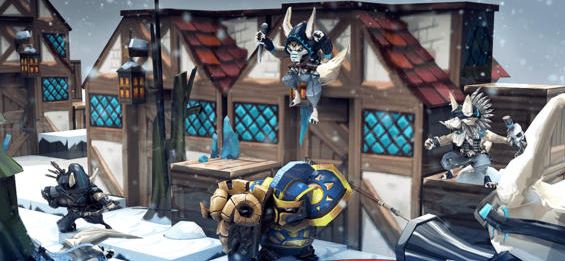GamesBeat: Can you explain in more detail that different philosophy? Why don’t you have the same bandwidth for mobile developers?
Greer: Because publishing on mobile is more of an investment. We’re just doing a lot more. We’re providing analytics. We’re providing monetization advice. We’re spending hard marketing dollars. There’s a producer dedicated to a game who’s working with them to help them navigate the app stores and business development that’s advocating features.
Apple and Google are already platforms in the way that we’re a platform on the Web. There’s not a comfortable place for us in that ecosystem unless we’re getting involved at a heavier level like I’m talking about. In the long-term, we’re definitely considering more open opportunities for promotion, but right now we’re focusing on high-quality, more individualized experiences and bringing the best out of a select group of titles.
GamesBeat: Does it not make sense to make that type of investment in the typical web-based product? Are the revenue opportunities not quite there?
Greer: I think there are. You want to get a game that’s going to transfer pretty well from Web to mobile. It’s about figuring out how to create a situation where the revenue opportunity, the developer’s costs, and our costs, to put it all together, are in line. There’s a good chance of success there for everyone. If one party there is not likely to get what they need, that’s not a sustainable relationship.
And it is a little bit tough, in the current mobile ecosystem, for some of the more casual games, just because paid games are not doing so well. But there are opportunities for free games to monetize pretty substantially with just ad revenue now. Partly because advertising costs and CPIs have been driven up.
We have a game called Run, which is an endless runner that was very popular on Kongregate Web. It doesn’t have any in-app purchases, although we are going to be adding that. We’ve been able to get a pretty good return with just advertising and the natural viral spread of the game. We did a little initial promotion of the game from Kongregate when it launched on Android, and it quickly hit 1.5 million installs with no further promotion. At that kind of scale, advertising revenue can really add up. That’s a different level of investment and involvement, finding ways to make that kind of game a success.
GamesBeat: In recent years, it seems like Kongregate’s been a bit more off the radar, because the industry’s been shifting toward mobile, and you’re relatively new in that space. What would it take to make Kongregate one of the known power players in that space?
Greer: Make the mobile publishing a success.
We may have been a bit off the radar, not because we weren’t doing well, but because we weren’t out tooting our horn in the press. We weren’t looking to raise the next round, as some companies are known to do. We’ve been growing our free-to-play revenue on the Web very substantially over the last few years. It was 55 percent last year, 100 percent the year before.
We may have been off the radar, but I don’t think that reflects what was going on in the company. It just reflects our commitment to self-promotion, if that makes sense. We are new in mobile, and there has been a total attention shift in the development industry toward mobile. The opportunity there is very real. But a lot of developers have abandoned Web a little too early, I think. As our traffic and revenue growth have shown, there are still substantial opportunities there. That’s something we want to leverage. In mobile, having hit games is what’s going to bring that attention. We’re working on that every day. I think we’ve got quite a collection of titles that people will be really starting to notice over the next few months.
GamesBeat: Can we expect any changes now that you’ve taken over the reins from your brother?
Greer: Let’s see. The average height of the CEO has gotten shorter? [Laughs] But no, not really. This has been a gradual transition between me and Jim, with me stepping up over the last three years as the business has focused more and more on free-to-play and mobile publishing and marketing, which is definitely my wheelhouse, my interest. Jim is still there. We’ve always run Kongregate together. We’re still running it together. It’s just a continuing shift in the pendulum.
We’ve always been committed to helping indie game developers, and game developers in general, distribute and monetize their games. We’re going to continue to be committed to that and expanding it into mobile. That’s the big change. We’re going to be more on the radar, because it’s off to a great start.
VentureBeat's mission is to be a digital town square for technical decision-makers to gain knowledge about transformative enterprise technology and transact. Learn More


